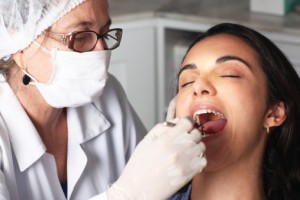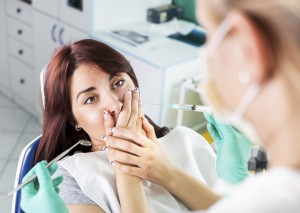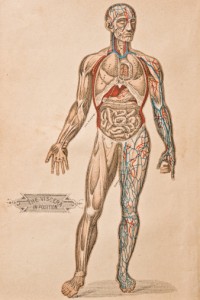 What many dentists know is that plaque is a biofilm, a combination of bacteria (500+ types), fungi, and protozoa, that mixes with nutrients from foods and drinks in the mouth to create a self-sustaining ecosystem. When plaque builds up near the gum line, it creates wounds that are the start of periodontal (gum) disease. What many dentists don’t know is that there are lessons to be learned about dentistry from the vitality of biofilm colonies: treatment should be specialized, treatment should be multidisciplinary, and treatment should be ongoing.
What many dentists know is that plaque is a biofilm, a combination of bacteria (500+ types), fungi, and protozoa, that mixes with nutrients from foods and drinks in the mouth to create a self-sustaining ecosystem. When plaque builds up near the gum line, it creates wounds that are the start of periodontal (gum) disease. What many dentists don’t know is that there are lessons to be learned about dentistry from the vitality of biofilm colonies: treatment should be specialized, treatment should be multidisciplinary, and treatment should be ongoing.
Continue reading What Can We Learn About Dental Care from Plaque?
Category: Uncategorized
Do Nice Dentists Finish Last? – Do Dentists Have to be Cruel to be Kind?
 Ever heard the phrase, “you’ve gotta be cruel to be kind?” It has never been truer than when referring to gum disease treatments. Periodontal disease affects as much as 80% of US adults, but the way dental practitioners handle periodontal treatments may be part of the problem. Patients avoid periodontal treatment due to lack of treatment urgency, not fully understanding necessary treatments, and money. Many dentists hesitate to fully explain and recommend periodontal therapy because they fear patients will simply cancel appointments due to the added cost. Instead, dentists tend to try the “nice” approach – recommending periodontal appointments every three months but billing them as regular dental cleanings during six month checkups. However, by changing the focus of periodontal disease treatment to communicating clearly, emphasizing assessment and prevention, and working with patients to maximize insurance benefits, dentists can better equip patients to receive the dental care they need.
Ever heard the phrase, “you’ve gotta be cruel to be kind?” It has never been truer than when referring to gum disease treatments. Periodontal disease affects as much as 80% of US adults, but the way dental practitioners handle periodontal treatments may be part of the problem. Patients avoid periodontal treatment due to lack of treatment urgency, not fully understanding necessary treatments, and money. Many dentists hesitate to fully explain and recommend periodontal therapy because they fear patients will simply cancel appointments due to the added cost. Instead, dentists tend to try the “nice” approach – recommending periodontal appointments every three months but billing them as regular dental cleanings during six month checkups. However, by changing the focus of periodontal disease treatment to communicating clearly, emphasizing assessment and prevention, and working with patients to maximize insurance benefits, dentists can better equip patients to receive the dental care they need.
Continue reading Do Nice Dentists Finish Last? – Do Dentists Have to be Cruel to be Kind?
Is Sedation Dentistry Right For You?
 Did you know that over 70% of Americans have reported experiencing some level of fear or anxiety when faced with an upcoming appointment at their local dentist’s office? These feelings are understandable, but they can also be dangerous for your oral health. After all, someone who dreads going to the dentist will put off needed appointments, allowing any problems they have to worsen to the point that they require even more time to fix. Thankfully, many practices now offer sedation dentistry, which can help patients relax and feel at ease during their appointment.
Did you know that over 70% of Americans have reported experiencing some level of fear or anxiety when faced with an upcoming appointment at their local dentist’s office? These feelings are understandable, but they can also be dangerous for your oral health. After all, someone who dreads going to the dentist will put off needed appointments, allowing any problems they have to worsen to the point that they require even more time to fix. Thankfully, many practices now offer sedation dentistry, which can help patients relax and feel at ease during their appointment.
If the answer to any of the following questions is “yes,” you may want to talk to your dentist about using sedation dentistry to increase your comfort level at your next visit:
- Does the mere thought of visiting the dentist induce anxiousness, nervousness, or even terror?
- Is it difficult for you to feel comfortable sitting still in a chair for a long period of time?
- Do you have a sensitive gag reflex or constant jaw pain?
- Do the sights, sounds, or smells of the dentist’s office make you feel stressed?
- Are you in need of multiple, lengthy procedures in order to restore your smile to full health?
- Do you struggle with feeling ashamed of your teeth?
There are several kinds of sedation dentistry available for patients. Nitrous oxide (laughing gas) is the mildest type, inducing feelings of warmth and contentment that wear off quickly after the procedure is finished. More severe dental anxiety may be better treated with oral conscious sedation or IV sedation, which helps patients achieve such a deep level of relaxation that they often don’t remember anything about their appointment. Please contact your local dentist to learn what kinds of sedation dentistry they offer and what they recommend for your unique situation.
Understanding Bruxism & TMJ Disorder: Find Relief from Nighttime Teeth Grinding
 Do you often awaken in the morning to find that your jaw is sore or that your neck and shoulders feel tense? Perhaps you suffer from frequent headaches that tend to begin in the area surrounding your temples. These symptoms are common in individuals with nighttime teeth grinding and daily jaw clenching, or bruxism and temporomandibular joint disorder (TMD). Fortunately, treatment for these orofacial issues is typically non-invasive, affordable, and easily accessible at your dentist’s office.
Do you often awaken in the morning to find that your jaw is sore or that your neck and shoulders feel tense? Perhaps you suffer from frequent headaches that tend to begin in the area surrounding your temples. These symptoms are common in individuals with nighttime teeth grinding and daily jaw clenching, or bruxism and temporomandibular joint disorder (TMD). Fortunately, treatment for these orofacial issues is typically non-invasive, affordable, and easily accessible at your dentist’s office.
What Causes Jaw Clenching and Teeth Grinding?
There are a variety of reasons that people with TMD and bruxism engage in the unconscious behavior of teeth grinding and clenching. Malocclusion, or an improper bite, is a major factor, as is daily stress. While you are sleeping, you are not able to stop the overworked muscles in the jaw and face from overtaking themselves further, leading to numerous symptoms that can affect you all day.
For many, the primary complaint related to TMJ disorder is headache pain that interferes with daily functioning. The delicate joints that connect your lower jaw to your cranium can become irritated and inflamed, causing nerve pain that can even spread to your upper back. This can lead to posture problems that further exacerbate the issue. In cases of teeth grinding, the patient is typically unaware that their jaws are placing inordinate amounts of pressure on their teeth all night. Bruxism can cause tooth fractures and enamel erosion, both of which can prove to be serious problems if not treated in a timely manner.
Bruxism & TMJ Treatment
In the majority of cases, a nighttime mouthguard is used to prevent damage to the teeth caused by clenching and grinding. This custom oral appliance fits comfortably in your mouth as you sleep, helping position the jaws properly so that the muscles aren’t unnecessarily strained. Patients who have been clenching their jaws for years are surprised to find that they experience relief from their discomfort in as few as one or two nights with their new appliance.
If you believe that you or someone in your family is suffering with the ill effects of TMJ disorder or bruxism, ask your dentist about a custom oral appliance. Relief could be a phone call away!
Here’s Some Helpful Valentine’s Day Dental Tips
 This Valentine’s Day, you’re probably looking forward to spending some quality time with your sweetheart, as well as indulging your sweet tooth with some yummy treats. Of course, it’s important to remember to show your smile some love as well! Here are some helpful guidelines for avoiding decay and making sure your teeth truly shine when you step out on the town with your date:
This Valentine’s Day, you’re probably looking forward to spending some quality time with your sweetheart, as well as indulging your sweet tooth with some yummy treats. Of course, it’s important to remember to show your smile some love as well! Here are some helpful guidelines for avoiding decay and making sure your teeth truly shine when you step out on the town with your date:
- While bad breath can be a common symptom of a great meal, it’s probably not that appealing to the person you’re sharing it with. Keep some floss in your pocket so that you can quickly get rid of food particles and pesky bacteria in the bathroom; then, pop in a mint to give your smile a fresh, appealing feel. If your bad breath persists even after the minty scent has worn off, though, that means it’s time for a checkup with your local dentist.
- Cross your fingers for chocolate on the big day! Solid chocolate (the ones without chewy or sugary centers) don’t tend to stick to the teeth like more chewy treats too, making them better for your oral health. In fact, dark chocolate is an even better option, as it contains less sugar than milk chocolate!
- It’s best to avoid gummy candies, hard candies, and sticky caramels, if possible. These can be a nightmare for your teeth. Instead, why not give your loved one flowers, a card, or even a romantic dinner at home?
- If you and your main squeeze just can’t stay away from the candy, it’s best to enjoy a few while our meal or just after it in order to keep from constantly exposing your teeth to sugar and harmful bacteria. Also, be sure to drink water and practice a good, thorough hygiene routine afterwards!
- Looking to surprise your sweetheart? Teeth whitening may be just the gift your smile needs to look its very best! Your local dentist can use this common cosmetic dentistry method to erase stubborn stains and improve the color of your teeth by several shades.
The Oral-Systemic Connection
 We live in an era of health consciousness, and that’s a good thing. Many people try to exercise and eat right. But being healthy is not simply a matter of what you put in your mouth, it’s also dependent on how you take care of your mouth. More and more evidence shows that there is a direct link between oral health and overall health.
We live in an era of health consciousness, and that’s a good thing. Many people try to exercise and eat right. But being healthy is not simply a matter of what you put in your mouth, it’s also dependent on how you take care of your mouth. More and more evidence shows that there is a direct link between oral health and overall health.
The oral-systemic connection characterizes the link between diseases and conditions in the mouth and health problems throughout the body. For example, periodontal or gum disease—called gingivitis in its early stages and periodontitis later—is caused by bacteria that can have access to the bloodstream when gum tissue bleeds, a common symptom of gum disease. Thus, preventing or treating gum disease and other oral infections early can be critical to avoiding secondary health concerns. So, those bi-annual dental checkups are more than just a matter of clean teeth. They can mean the difference between life and death.
Medical Conditions that Start in the Mouth
While research continues, the following is a partial list of medical conditions and diseases that have already been found to have a connection to oral health:
- Heart disease
- Stroke
- Osteoporosis
- Diabetes
- Some forms of cancer
- Some autoimmune disorders
- Low birth weight in newborns
Furthermore, the importance of maintaining oral health in order to have a proper diet and nutrition cannot be understated. People who have missing teeth are often unable to eat raw fruits and vegetables and other healthy foods that require chewing. Therefore, they choose softer foods that tend to be higher in saturated fats and sugar, both of which can have detrimental effects on the body when over consumed.
The Oral-Systemic Connection and You
What can you do to keep your oral-systemic connection healthy? First of all, brush your teeth and floss twice each day. Be sure to floss well below the gum line where bacteria hide. Secondly, see your dentist at least twice each year for a checkup. With regular visits, you and your dentist will better be able to recognize changes in your oral health and fend off any conditions that could compromise your general health.
Keep Your Smile Happy and Healthy This Holiday Season
 The holidays are a great time for family, lots of food, and guilt-free indulgence. However, the last thing you probably want is to have to spend some quality time with your local dentist right in the middle of all this fun. That’s why it’s always important to make smart choices and be aware of potential problems that could threaten your oral health. Here are five helpful tips to keep in mind when you’re sitting down at the table with your loved ones to enjoy that big, scrumptious meal:
The holidays are a great time for family, lots of food, and guilt-free indulgence. However, the last thing you probably want is to have to spend some quality time with your local dentist right in the middle of all this fun. That’s why it’s always important to make smart choices and be aware of potential problems that could threaten your oral health. Here are five helpful tips to keep in mind when you’re sitting down at the table with your loved ones to enjoy that big, scrumptious meal:
- Be careful when it comes to chewy treats. Having a sweet tooth is fine in moderation, but when it comes to sticky substances, less is always more. Foods like caramel and taffy can encourage tooth decay and even yank out fillings.
- Don’t crack nuts between your teeth. Nuts offer several valuable health benefits, but don’t treat your mouth like you would a nutcracker’s. Shelling nuts with your teeth can cause serious enamel and gum damage. You’re definitely better off removing the shells before enjoying your snack.
- Enjoy your wine, but not too much. The high acidity levels in wine can eat away at the enamel on your teeth, which is really important to retain when it comes to fighting off decay and cavities. Avoid swishing wine around in your mouth for too long, and be sure to drink plenty of water in between glasses.
- Don’t let stress get you down. Holiday anxiety is a very common, understandable problem, but be careful – it can lead to grinding and clenching of the teeth. Seeing your local dentist about a nightguard can help you protect your smile while you sleep and avoid unpleasant damage.
- Feel free to feast! Yes, you heard right! When you eat, more and more saliva is produced, which can be a beneficial agent when it comes to neutralizing acids and repairing tooth enamel. Just be sure to take breaks here and there from the food so that it has time to work within your mouth.
Don’t Just Brush Your Teeth… Brush Your Teeth Correctly
 Most people know that good oral hygiene includes brushing your teeth at least twice a day. And for most, those two times are usually in the morning—as you’re rushing to work or getting the kids off to school—and at night, when you’re fighting to keep your eyes open before falling into bed. Regardless of whether your day is beginning, ending or somewhere in between, proper brushing is worth the time and effort for good oral health.
Most people know that good oral hygiene includes brushing your teeth at least twice a day. And for most, those two times are usually in the morning—as you’re rushing to work or getting the kids off to school—and at night, when you’re fighting to keep your eyes open before falling into bed. Regardless of whether your day is beginning, ending or somewhere in between, proper brushing is worth the time and effort for good oral health.
First off all, did you know that proper brushing requires at least two minutes? Most adults spend a fraction of that time brushing their teeth every morning and night. Try looking at the clock when you start brushing, then brush normally and check the time when you’re finished. Chances are you didn’t spend enough time to thoroughly clean your teeth. To really do a good job and ensure better oral hygiene, spend two minutes brushing.
What is the Best Technique for Brushing Teeth?
When brushing your teeth, it’s important to hold your toothbrush at a 45 degree angle against the gum line and sweep or roll the brush away from your gums. Don’t brush side to side, which can scrape your gums. And be sure to use short strokes as you brush away from your gums.
Start out cleaning the outer surface of your upper teeth and then your lower teeth. Continue by brushing the inner surface of upper and lower teeth. Then, brush the chewing surfaces of your teeth, concentrating on your molars. Finally, be sure to brush your tongue, too.
Tools for Proper Brushing
Always choose a soft brush with round-ended bristles. Stiff bristles can hurt your gums. A powered toothbrush can be a good choice, too, especially if you have difficulty brushing because of limited manual dexterity. The type of toothpaste you choose is an individual matter. There are a variety of toothpastes to address a variety of concerns from teeth whitening and cavity prevention to eliminating tartar and reducing teeth sensitivity. Talk with your local dentist about which toothpaste is best for you.
Prepare Little Smiles for Trick-or-Treating with Preventive Dentistry
 Halloween is undeniably a favorite holiday for millions of children from across America, offering the perfect opportunity to dress up in creative costumes and bring home tons of sweet treats. While we’d never discourage any of the festivities and fun of trick-or-treating, we do want to emphasize the importance of keeping those precious pearly whites healthy this holiday season. With preventive dentistry solutions like dental sealants and fluoride supplements, we can help ensure your child’s continued oral health all year round.
Halloween is undeniably a favorite holiday for millions of children from across America, offering the perfect opportunity to dress up in creative costumes and bring home tons of sweet treats. While we’d never discourage any of the festivities and fun of trick-or-treating, we do want to emphasize the importance of keeping those precious pearly whites healthy this holiday season. With preventive dentistry solutions like dental sealants and fluoride supplements, we can help ensure your child’s continued oral health all year round.
Preventing Cavities this Holiday Season
The two most common childhood dental concerns are tooth decay and periodontal disease. Because prevention is always the best medicine when it comes to your child’s oral health, routine dental exams and cleanings are integral to a future of healthy smiles. Particularly around the holidays, it is important to consider the effects of sugary treats – including Halloween candies like lollipops, chocolate, and candy corn – on a child’s vulnerable teeth. Your child’s tooth enamel isn’t as resistant to plaque buildup, so twice yearly cleanings are vital.
During your child’s dental visit, ask about dental sealants and fluoride supplements. Dental sealants effectively protect teeth from cavities, especially in hard-to-reach places like the first and second molars. Fluoride supplements can actually fortify tooth enamel, remineralizing the surfaces of the teeth to further ward off attacks from cavity-causing bacteria. After your child is done divvying up all of his or her favorite treats from Halloween, consider donating the excess to a Halloween buyback program. This will help keep those cavity-causing temptations out of reach, further protecting your child’s smile.
Keep Your Child’s Smile Shining Brightly!
Your child’s dentist is your ongoing partner in building a strong foundation for oral health in the future. If you have questions about preventive dentistry services, including fluoride and dental sealants, contact your local dentist’s office for more information.
The Benefits of Green Tea
 People are always trying to find the tastiest and best ways to quench their thirst. Whether it is a glass of water or an energy-inducing sports drink, finding a beverage that is both satisfying to their taste buds and nourishing to their bodies can be difficult. What people may not realize is that tea, specifically green tea, has amazing benefits for your body, and is also delicious! Being excellent for your oral and bodily health, green tea is an excellent option for those who wish for something flavorful and wholesome.
People are always trying to find the tastiest and best ways to quench their thirst. Whether it is a glass of water or an energy-inducing sports drink, finding a beverage that is both satisfying to their taste buds and nourishing to their bodies can be difficult. What people may not realize is that tea, specifically green tea, has amazing benefits for your body, and is also delicious! Being excellent for your oral and bodily health, green tea is an excellent option for those who wish for something flavorful and wholesome.
For those who are heart conscious, green tea is amazing for your heart! Green tea contains catechin, which is an antioxidant that fights and prevents cell damage. This equals a strong, healthy heart. Studies have also proven that consuming green tea increases the amount of activity in the brain that controls working memory. Another instance where green tea is good for your brain, it has been shown that green tea blocks the development of the type of plaque that is linked to Alzheimer’s disease.
Green tea has also been shown to stabilize blood sugar levels, which is great for those who have diabetes. Having an amino acid called theanine, a calming effect can take place while drinking green tea. This is especially helpful for those who are under high levels of stress. Though losing weight is never an easy experience, green tea boosts your metabolism, making you burn more fat calories. A high valuable beverage, green tea has the potential to help your smile, heart, and brain!